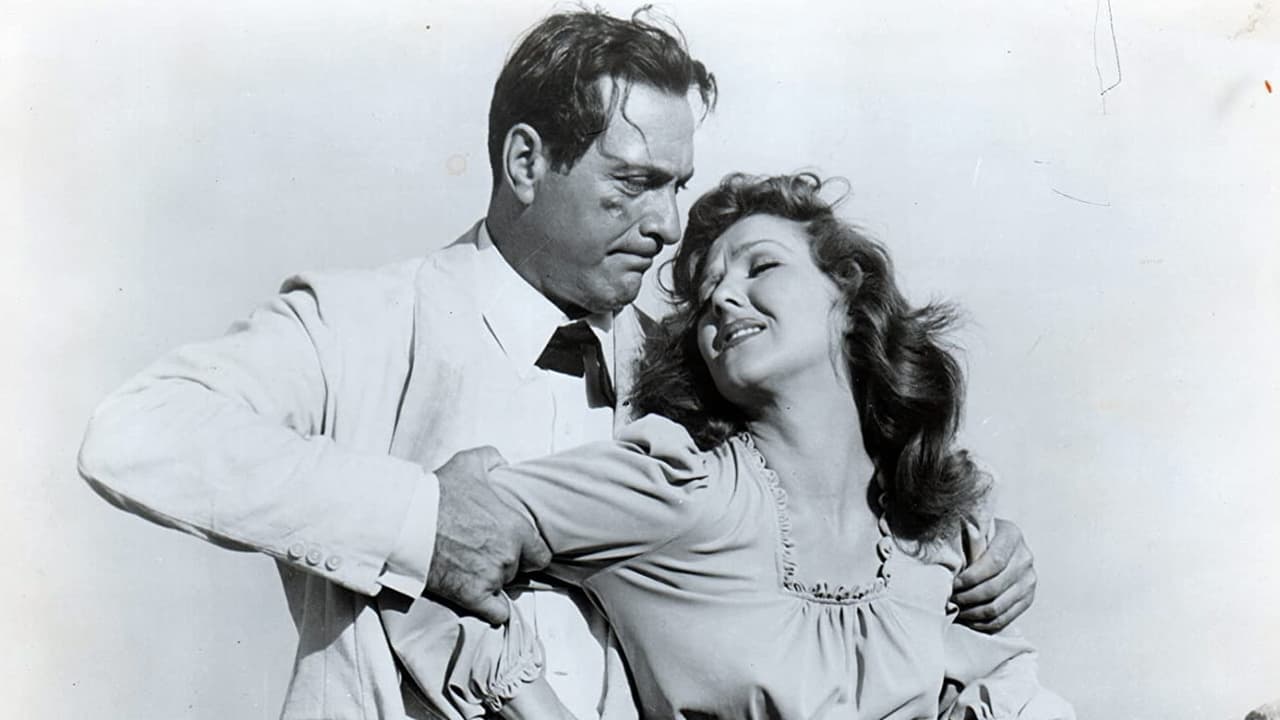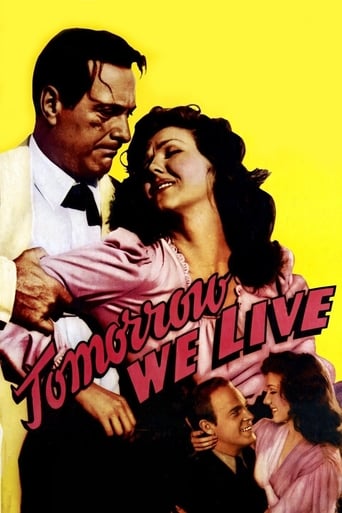Gurlyndrobb
While it doesn't offer any answers, it both thrills and makes you think.
Hadrina
The movie's neither hopeful in contrived ways, nor hopeless in different contrived ways. Somehow it manages to be wonderful
Roman Sampson
One of the most extraordinary films you will see this year. Take that as you want.
Kaydan Christian
A terrific literary drama and character piece that shows how the process of creating art can be seen differently by those doing it and those looking at it from the outside.
sol1218
***SPOILERS*** Former screen Latin lover with a tough New York City accent Ricardo Cortez plays big time hood Alexander Casear Martin who's nicknamed The Ghost. Martin got a racket going in the middle of the Arizona Desert storing used tires and selling them for a profit in the black market. This while his country the USA is involved in a life and death struggle with the forces of fascism around the world. Known as the Ghost because he survived two assassination attempts Martin is told by his doctors that he doesn't have long to live so he lives dangerously by throwing his weight around at rival gangsters one being Big Charlie who's trying to muscle into his black market racket.As we soon find out Martin uses Pop Bronson's, Emmett Lynn, diner called the "Busy Bee" as the center of his criminal operations. It's Pop's daughter Julie, Jean Parker, who's just back from collage, which she dropped out of, who smells a rat in her dad's relationship with Martin and want him to discontinue it. There's also Julie's former boyfriend now an officer in the US Army Let. Bob Lord, William Marshall, who wants to rekindle his love affair with her who's now stationed in an army camp not far from Pop's diner. It's doesn't take long for the womanizing Martin to start to work on Julie whom he met at his night club "The Dunes" where she went to have a few drinks and party. All throughout the rest of the movie Marin's obsession with Julie blinds him from what Big Charlie is planning for him. Julie soon finds out why her father Pop is so deeply involved with Martin in that he's been blackmailing him for the last eight years. That in Pop being a wanted fugitive from the law in a jail break he was involved in where three people were killed.***SPOILERS*** The film seems to try to equate Alexander Caesar "the Ghost" Martin with fascists dictators like Hitler and Togo whom the USA at the time, 1942, was at war with. That seems to be the reason that Julie's boyfriend is a member of the US Military slated for the Pacific Theater of War to battle it out with the fascist Japanese Empire as well as doing battle against Martin and his hoods back home. Still as hard as it tries the movie falls flat on its face in trying to do that. Even the reality challenged Martin finds it all ridicules in a backwards sort of way when he's compared to Adolph Hitler by Bob Lord. That in Martin feeling that Hiter is nothing but a two bit hood who at the time controlled almost all of Europe not a successful mob boss like himself who only controls, and is in danger of losing it, a small patch of land in the middle of the Arizona Desert.The best part in the movie is saved for the last when after being worked over by Big Charlie's men Martin ends up in the middle of the desert hitchhiking his way to Pop's diner, with Pop 's daughter Julie giving him a lift, where he ends up completely losing it. Finally realizing that his criminal empire is history Martin suddenly goes nuts or wacko with a fatally wounded Pop Bronson, whom Martin had just gunned down, putting him out of his both madness as well as misery with a bullet to his gut.
howdymax
Another PRC quickie from Edgar Ullmer, but he threw everything and the kitchen sink into this one. The story revolves around a character called "The Ghost" played to the hilt by Ricardo Cortez. It takes place at some lonesome outpost in the desert. The Ghost is a mysterious gangster from the east who opens a nightspot out west and begins to corrupt everything he touches. One of his victims is an old geezer played by Emmett Lynn, who once was charged with murder. The Ghost blackmails him into a black market tire scheme. (This was 1942 and tires were worth more than gold). He than sets his sights on the old timer's daughter played by an unremarkable Jean Parker, who is really in love with a soldier. Then it gets weird. The Ghost is threatened by a rival gangster called "Big Charlie". You have to wonder, how many gangsters can they possibly have out in cactus country? Let's see; we have a big shoot out between The Ghost and his gang and Big Charlie and his gang. The Ghost escapes, comes to believe he is immortal, shoots the old geezer in cold blood, and THEN swears his undying love for the daughter and wants her to run away with him. I would call that bad timing. As this unlikely scene plays out, we come to find that The Ghost is as nutty as a Snickers Bar. Meanwhile, the old geezer rolls over, shoots The Ghost and croaks on cue. The daughter calls the sheriff, declares her love to her soldier boy, and we finish up with a huge military parade of trucks, jeeps, and assorted obsolete military equipment across the desert, right past the front door of the old geezers cafe.Look, this is Edgar Ullmer. This is PRC. It was an amazing exercise. Can I say, they don't make them like this anymore. The one thing I would mention is the performance turned in by Ricardo Cortez. Most film buffs remember him as the suave gangster, the smooth operator of the 30's. This film was made slightly after his prime and, I think, he elected to, or was forced to, take another tack. In this film we initially see him in his traditional role as a rather elegant gangster. But as the film progresses, he gets loonier and loonier until, toward the end, he looks less like Ricardo Cortez and more like Zeppo Marx. This is one of a kind. Cowboy gangsters and a military parade in the same movie - and don't forget to buy your war bonds.
manuel-pestalozzi
It is amazing how some poverty row productions have coherent scripts with quite a few interesting aspects which lifts them above the average fare (always provided you are interested in movies of this epoch). There is quite a lot going on during the short 63 Minutes this movie will take of your time.The heroine - a very wholesome looking Jean Parker – is the daughter of the owner of a small café and gas station in the middle of the desert. Her father is involved (he operates an illegal stash of tires) with a gangster who retreated here from the East and opened a night club in the desert. It is a strange mixture of a Corleone-kind of figure and Edward Robinson's Johnny Rocco in Key Largo.The girl has to choose between the gangster and her former boyfriend who has just joined the army. The gangster knows that because of injuries which date from shootouts he will not live much longer and tries to use this as an argument for the hesitant girl to marry him. He is in trouble because some competing local gangsters (all wearing ten gallon hats) want to run him out of the place (this is also slightly reminiscent of Godfather II).The army officer boyfriend has a showdown with the gangster. He enters his snazzy office in the night club, looks around, nods in confirmation and says: This looks like Berchtesgaden, you know, where Hitler chews rugs. After this rather surprising opening he goes on to tell the gangster that he, like Hitler, will soon be a has-been and that there will be no place for guys like him in the country. It's a little like Bogart's speech in Key Largo.Oh yes, and the girl's poor father is forced by the gangster to bury a corpse in the desert. Like I said, quite a lot is going on and everything ties in nicely in the story, which is not too often the case in today's A-productions. Edgar G. Ulmer as always succeeds to create an atmosphere which helps the story along and makes this movie worth your while.
robert_deveau
After an opening sequence featuring stock footage so dark and dupey that its difficult to tell what we're seeing, the film proper begins (and lightens up to acceptable visual quality) and moves into Pop Bronson's (Emmett Lynn) desert diner. We find Pop in mid-conversation with his daughter Julie (Jean Parker, who also starred in Ulmer's BLUEBEARD) who has just dropped out of college. Pop has been sending her money for years to put her through school and he's understandably upset about her sudden, inexplicable dropout. The scene is deliberately disorienting, as it takes a while before we understand the context of their conversation. When Julie accuses her father of black marketeering (this is war time, after all), Pop gives her a vicious slap. The whole scene prepares us for an unsettling experience which the film does not deliver until it's more than half over, settling in to long soap opera conversations filmed in uninteresting master shots. We meet Ricardo Cortez, gangster owner of a desert night club, who has earned the moniker of "The Ghost" for his survival of two attempts on his life. Thirty-five minutes into this barely 63 minute movie, the guns start blazing, the camera begins to move and the editor wakes up. Julie's Army boyfriend shows up to give The Ghost a major dressing-down, comparing him to Hitler and warning him that the honest little people will soon beat his pants off. Instead of the little people, its a rival gangster who beats The Ghost nearly to death and burns down his club, driving the man mad. The film now races to a speedy, suspenseful conclusion. In his career-spanning interview with Peter Bogdanovich Ulmer described this as a horror film influenced by Grand Guignol (which it is not), but its opening scene, final 30 minutes, odd patriotic imagery and good performances from Cortez and Parker make it worth seeing for anyone interested in Ulmer's career of making something out of nothing.

